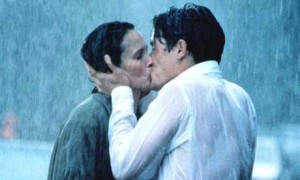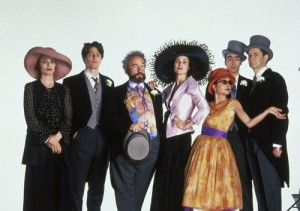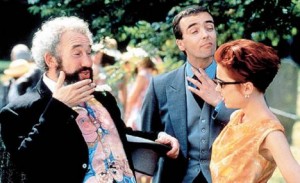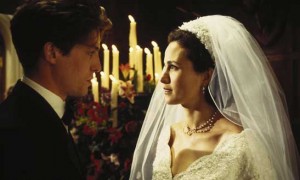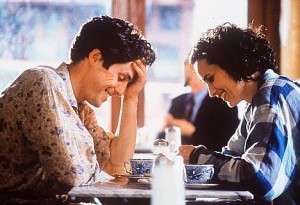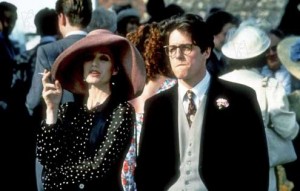Four Weddings and a Funeral ***** (1994, Hugh Grant, Andie MacDowell, James Fleet, Simon Callow, John Hannah, Kristin Scott Thomas, Charlotte Coleman) – Classic Movie Review 370
‘Love means never having to say I do.’ – Ad line.
Directed by Mike Newell and written by Richard Curtis in 1994, this sensational British romantic comedy was a worldwide hit and the first British film to score a no 1 at the American box office since A Fish Called Wanda in 1988. It was Oscar nominated for Best Film and Best Original Screenplay. It focuses on a group of 30something friends who wonder if they will ever find true love and marry, while of course they attend the four weddings and one funeral of the title.
A fresh, bright new star was born in Hugh Grant in his breakthrough role that won him a Golden Globe Award as well as a BAFTA Film Award for Best Actor. Aged 34, Grant beat off competition from Alan Rickman and turned himself into an international celebrity by his exuberant, sympathetic playing of a bumbling toff called Charles. He thinks he’s finally found Miss Right in an American woman he keeps bumping into at weddings, called Carrie (Andie MacDowell).
The part is an unalloyed triumph for Grant. It turned itself into Grant’s defining role, in a persona that he’s since found himself been typecast in and struggled, not too successfully, to overcome.
Curtis’s writing and the performances vary from the intelligent and subtle to the broad and obvious, but almost all of it works really well, making it a funny, sometimes hilarious, occasionally touching comedy about the power of love among the middle classes. Lightweight it may be, but it is a real crowd-pleaser. It’s still Grant’s and Curtis’s best film. They’ve never been able to top it. Incidentally, Curtis wrote the film after looking through old diaries and seeing he’d been to 72 weddings in 10 years.
MacDowell is lovely and appealing, though her part’s underwritten, often leaving her with nothing much to do except look beautiful and simply look perplexed at the daft Brits. This gives her strong competition form a scene-stealing Kristin Scott Thomas, who won the Bafta for Best Actress in a Supporting Role for her charming performance as Fiona at Wedding One.
Elsewhere, Rowan Atkinson gets his silly laughs as the dithering Father Gerald at Wedding Two. And Simon Callow plays his gay character Gareth very well, though as written it’s a shade patronising and overdrawn. James Fleet, John Hannah, David Bower, Charlotte Coleman, Corin Redgrave, Rosalie Crutchley (in her last film), Jeremy Kemp and Kenneth Griffiths (the Mad Old Man at Wedding One) are also in the memorable cast.
Four Weddings’ warm-hearted, good-natured high spirits keep it several notches above any other British film comedy around and it all adds up to a lovely package of romcom at its quality finest. On a £3.5million budget (they couldn’t afford to film the Scottish wedding in Scotland!), it grossed more than £25million in the UK alone and has taken more than $260 million worldwide. Somebody got seriously rich.
MacDowell made a wise decision, waiving fee for the film in favour of a percentage that netted her $2 million, compared with Grant’s salary of $100,000.
The poem read in the funeral is called Funeral Blues by W.H. Auden.
There are 28 uses of the F word from the very start as Charles wakes up and looks at his bedside clock and swears. Some of them are very inventive – eg ‘f***adoodledoo’.
© Derek Winnert 2013 Classic Movie Review 370
Check out more reviews on http://derekwinnert.com

